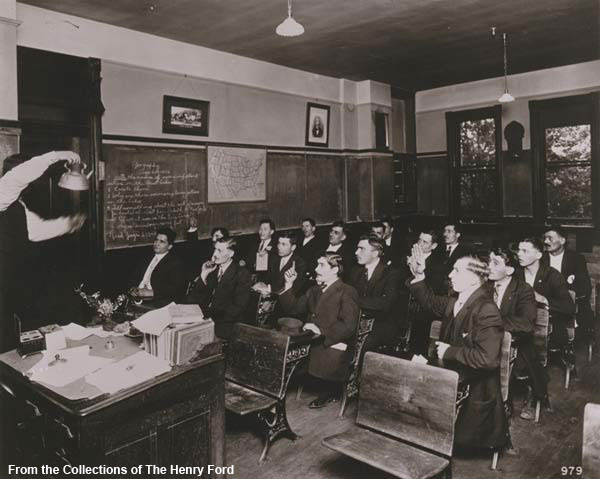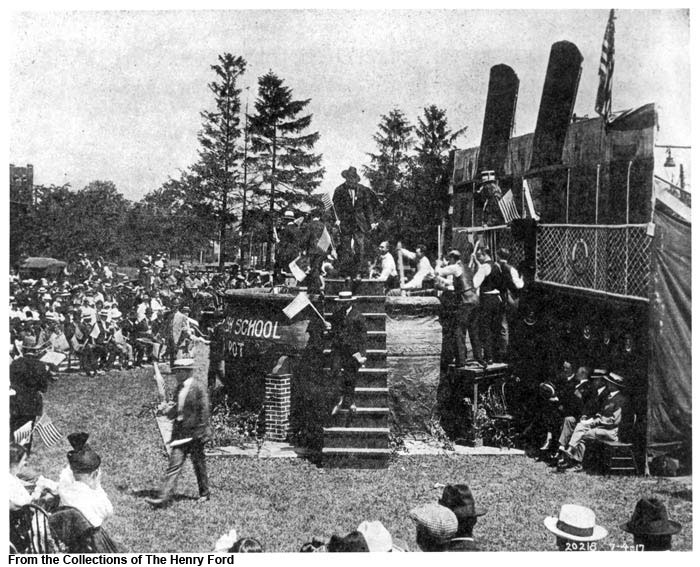Ford English School
Established in 1914, the Ford English School taught the company’s immigrant workers more than just how to speak English. It taught them about American culture and history and instilled the importance of such virtues as thriftiness, cleanliness, good manners, and timeliness. Pictured below are a classroom at the Ford English School (top) and the school’s graduating class emerging from the "Melting Pot" (bottom), a symbol of their having put aside their ethnic identity and become good Americans, on July 4, 1917. Between the photographs is an excerpt from “Factory Facts About Ford” (1915) that describes the English School and includes a typical lesson.

Ford English School (excerpt taken from the publication "Factory Facts From Ford," 1915 pp. 51-53)
When the work of the Advisors was started, a serious problem presented itself. It was found that a large percentage of the employees in the factory could not speak the English Language, which necessitated the employment of a large number of interpreters to work with the Advisors.
It had been ascertained that it is almost essential that a workman have a knowledge of English, from a "Safety-First" standpoint, so that he be able to understand the explanations of safety devices in the factory, as well as to thoroughly understand the requirements of his work. This knowledge also helps to make better citizens, and protect them against the many pitfalls which lurk in the path of the unwary foreigner.
To remedy these conditions the Ford English School was organized. That the men appreciate what is being done for them is clearly shown by the number of letters received from employees, which are sent without solicitation, and express, in good English, the sincere obligation they feel toward the work, which is enabling them to enjoy the advantages and comforts previously unknown to them. After careful investigation into the methods of teaching, the cumulative, dramatic system was adopted. This plan is very similar to the well-known Berlitz system, the early lessons of which are particularly adapted to home study, and teaching in the Ford shops. Following is given the first lesson under this plan:
ENGLISH FOR FORD MEN-LESSON NO.1
Going to the Public Library
1. I finish my supper at 6 o'clock P. M.
2. I get up from the table.
3. I look out doors.
4. It is raining.
5. I go into the cloak room.
6. I get my overcoat, rubbers and umbrella.
7. I clean my overcoat with a hand broom.
8. I put the rubbers on my feet.
9. I put my overcoat on.
10. I button my overcoat tightly about my neck. 11. I brush my hat.
12. I put on my gloves.
13. I take my umbrella.
14. I open the door.
15. I say "Goodnight" to my family.
16. I go to the Public Library.
Fact -- There are many good books in the Public Library.
In using these lessons the teacher reads the verbs, having the class repeat them after him until they are fixed in their minds. After this the teacher reads the sentence, the class repeating it after him. So that the thought to be conveyed can be clearly understood, in reading this sentence the teacher goes through the motions of the thought conveyed, or has the object referred to in his hands. As an example, in the seventh sentence of this lesson the teacher will have a hand broom in his hand, and goes through the action of using it. This pantomime interpretation of the lessons thoroughly instills in the student's mind the practical illustrations of the verb, or name of the article in the lesson.
When the school was organized there was a single instructor, and only a score or so of students. Today there are more than 150 instructors, and over 2,500 students. The instructors are all employees in the factory, composed of foremen, machine operators, clerks, and plain workmen, who voluntarily give their time to this commendable work.
Many types come before the instructors. There is the type which has a good education in his native tongue, but knows no English; and the type that has a fair education in the mother-tongue, and knows a few disconnected English words, usually slang. Then there is the group which possesses little, if any, education, either native or English. The first and second classes progress rather rapidly, some of the men being able to read, write and speak English with a fair degree of correctness at the end of three months, though the average time for completing the course is six months. One class, set aside by itself, is very slow, completing but ten lessons in ten months.

Images: From the Collections of The Henry Ford. 1) P.833.979 and 2) P.O.7227